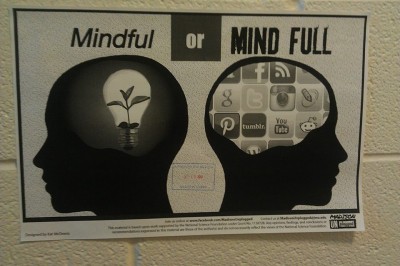Last week, Robin James (@doctaj) wondered if “digital dualism” was really “ideal theory” a-la Charles Mills. She argued that what we call digital dualism is really a critique of idealization; that the “ought” of the relationship between humans and technologies reflects the “is” of a privileged group. This is expressed both dualistically but also monolistically.
Within the comments, we discussed the complex designation of “ought” in the relationship between humans and technologies. Without taking on Robin’s ideal theory hypothesis, I want to take about a thousand words here and think about the “ought.” That is, I want to explore what the “good” technosubject does, and how zi relates to technologies within the contemporary era.
The Ought
The context here, is that of mass global connectivity, with uneven distribution of access, use, and skill, each of which concentrates in industrialized nations and among those with relatively high(er) levels of financial and cultural capital.
Within this context, how is the “good” citizen to interact with technology? What does this ideal relationship look like? To investigate this, I begin by teasing out what, as indicated by public discourses, this relationship ought not look like.
The ought not
The ought not is occupied by two extremes: technophilia and technophobia. Or, more simply, people ought not fetishize technologies, or let technologies overtake them, nor should they fear technologies, remain ignorant to their usage, or ignore the ongoings of digital mediation.
In reference to technophilia, or the fetishization of technology, we can turn to the work of psychologist Kenneth Gergen, who argues that the key problem of contemporary society is that of saturation. Technological developments, according to Gergen, facilitate too much connection, too much information, too many voices. Although he concedes that new technologies provide new opportunities, each opportunity couples with an obligation, trapping contemporary social actors in webs of their own desires. The mobile phone, for instance, affords communication while outside the home, and in doing so, obligates the phone owner to avail hirself to incoming calls and reach out to others with pertinent information in a timely manner (e.g. “Honey, why didn’t you call and say you would be late for dinner!?”). The 24/hour news cycle and RSS feeds help keep people informed, while compelling them to stay up-to-date on an increasingly wider and quickly moving set of global and local issues. Similarly, social network sites afford fast and easy communication with vast audiences through both text and image, and in doing so, create expectations of the social actor to document and share hir minutia and to keep up with the minutia of hir friends. Such obligations threaten to overrun the actor, stifling hir agentic movements, overtaking her creative and self-reflective capacities. This is nicely depicted in an image I saw hanging on the walls of my university last week.
The flip side of the technophile—the technophobe—also runs counter to the amorphous ideal. This is the Luddite, the person who, through fear, ignorance, or lack of capital, can’t keep up with recent technological developments. This is perhaps most effectively communicated through humor, in which such groups act as the butt of jokes, the means by which the technologically “advanced” establish their righteousness. Sites like Buzzfeed and Lamebook offer nice examples, like the one below.
This is funny (and admittedly, I do find it quite funny) because it plays on an implicit value—technological savvy—that certain segments of society fail to grasp. Note, we do not see humorous tropes about kids in developing countries who don’t have email addresses. We don’t want to feel bad about our access to technology, but do want to establish a proper relationship with it.
The ought
The ought rests between the two extremes described above. The ought, I argue, is a carefully curated relationship with technology, one in which the social actor has access, know how, and above all, control. As Laura Portwood-Stacer aptly argues, “opting-out” is a privileged position, and there is a qualitative difference between non-users and “conscientious objectors.” This is the discursive line that Sherry Turkle straddles so effectively. She loves technology, but fears our pathological relationship with it. Pathology here, of course, is a loss of control, a domination by the technology rather than domination of the technology.
Historically, and continuing into the present, scholars note the use of technologies as a means of dominion over nature. The plow lets us dominate the agricultural fields, the car lets us dominate physical distance, electric heat lets us dominate cold, and ipods let us dominate boredom. This of course reflects the larger Western value of self control as classically theorized by Weber, and dominion over the environment more generally. In an interesting tension, the very technologies that humans use to control the natural world, become the objects of threat in the contemporary era.
The “ought” then, this curatorial dance, is reserved for a select group. It reflects those for whom the failing is of choice, rather than necessity or default. The ought reflects the “is” of the young, white, wealthy digerati with the privilege to unplug and the capacity to reconnect on their own terms.
Follow Jenny on Twitter @Jenny_L_Davis




Comments 14
Atomic Geography — October 22, 2013
Great follow-up to you previous post!
I wonder if domination is the only possible dynamic between humans and tech. Taking Haraway somewhat out of context we could say: "The political struggle is to see from both perspectives at once because each reveals both domination and possibilities unimaginable from the other vantage point."
I think your post also echo Heidegger's approach focusing not so much on tech artifacts as the "Enframed" frame of mind - the Technological Horizon http://atomicgeography.com/2013/10/22/the-technological-horizon-the-cyborg-terrain-system/ if you will.
ArtSmart Consult — October 22, 2013
The “ought” of the few privilege drives the technology for the masses. The technology for the masses drives the "ought" for the masses. But that's only because the masses don't drive technology as much as they "ought" to.
I still don't understand what this has to do with digital dualism. But then again, I'm not sure I understand digital dualism or the inherit problem of what is most understood as digital dualism.
robinjames — October 23, 2013
Hi Jenny--This is so great! This strikes me as exactly right, mainly because it is consistent with theories of neoliberal subjectivity and virtue (or, the empirical stuff you point to reinforces these theories). I really love how you put it in terms of the language of "self control"--self control isn't abstention (that's seen as one extreme), but _moderation_. Or, you control yourself by monitoring a careful balance between too much and too little. I wonder if too much/too little isn't a universal standard, but calibrated to individual (and possibly group) subject-positions? Like, this is just right for me, but too much/not enough for them/the other/etc.?
I think your language of pathology is both significant in its own right, and perhaps helpful wrt this question. If pathology is "loss of control," then I wonder if we see some subjects/populations as inherently "unruly" or unable to control themselves (and thus in need of State management/intervention). In other words, some people are thought to be incapable of doing things in a non-pathological, healthy way, so their use of technology will be both (a) highly regulated and (b) whatever they are permitted will be devalued (as irrelevant) or avoided (as itself pathogenic).
Adele — October 23, 2013
Love this article, Jenny - very concise and informative! Considering the "ought" in regards to technology is new to me, and this was a really helpful way of laying it out. After considering it, and the few image examples you used, I was wondering if the two extremes of the ought not are related to age or generation differences. Often, people in older generations that didn't grow up with the same technology of the younger generation are presumed to fall under the technophobe, and thus are the butt of some jokes of the technophile young. A particularly common example I have heard a lot would be the addition of the word "the" in front of digital services such as Google or Netflix. I was wondering what you thought on this; do you think that the younger generations will have a harder time reaching the "ought" you describe above?
A Culture of Moderation: or, no more messages from Satan » Cyborgology — November 8, 2013
[…] the last 30 years of pop culture on its way to saying something about Jenny’s recent post on “The ‘ought’ of Technology.” I want to broaden the lens from technology in particular to pop culture in general, because I […]
On Balance, or Why Privacy Is A Red Herring » Cyborgology — December 6, 2013
[…] balance, the “balance” between individual freedom and national security, and, as Jenny notes, the “balance” between tech use and […]
Friday Roundup: Oct. 25, 2013 » The Editors' Desk — April 1, 2014
[…] Cyborgology looks at the technology Gravity (from a different vantage point from that presented on Girl W/ Pen! last week), can’t peel their eyes off the ceremony of the Apple Product Launch, and considers the pressure of tech. […]
On Balance, or Why Privacy Is A Red Herring — August 13, 2014
[…] between individual freedom and national security, and, as Cyborgology’s Jenny Davis notes, the “balance” between tech use and […]